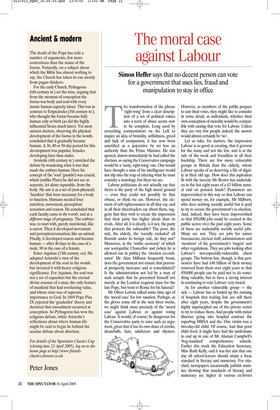Ancient & modern
The death of the Pope has relit a number of arguments, few more contentious than the status of the foetus. Naturally, on a subject about which the Bible has almost nothing to say, the Church has taken its cue mostly from pagan thinkers.
For the early Church, Pythagoras (6th century BC) set the tone, arguing that from the moment of conception the foetus was body and soul with every innate human capacity intact. This was in contrast to Empedocles (5th century BC), who thought the foetus became fully human only at birth (as did the highly influential Stoics much later). Yet most ancient doctors, observing the physical development of the foetus in the womb, concluded that it gradually became human. A 36, 40 or 50-day period for this development was popular, females developing later than males.
Aristotle (4th century BC) enriched the debate by wondering what it was that made the embryo human. Here his concept of the ‘soul’ (psukhê) was crucial, which (unlike Plato) he did not see as separate, let alone separable, from the body. He saw it as a set of (non-physical) ‘faculties’ that were necessary for a body to function. Humans needed four: nutrition, movement, perception/ sensation and reason. He concluded that each faculty came in the womb, and at a different stage of pregnancy. The embryo was, to start with, purely nutritional, like a carrot. Then it developed movement and perception/sensation, like an animal. Finally, it developed reason and became human — after 40 days in the case of a male, 90 in the case of a female.
Enter Aquinas (13th century AD). He adopted Aristotle’s view of the development of the soul in the womb, but invested it with heavy religious significance. For Aquinas, the soul was not a set of capacities but the eternal divine essence of a man, the only feature of mankind that had everlasting value, and whose state was of supreme importance to God. In 1869 Pope Pius IX rejected the ‘gradualist’ theory and declared that ensoulment occurred at conception. So Pythagoras has won the religious debate, while Aristotle’s reflections about where human life might be said to begin lie behind the secular debate about abortion.
























































 Previous page
Previous page